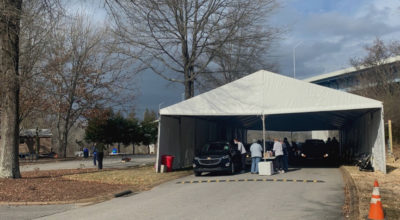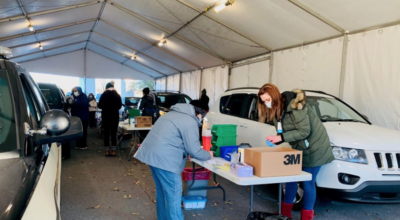

As the relator in the signal case state of Tennessee ex rel David Tulis vs. Bill Lee, governor et al, object to a private phone hearing set Jan. 11, 2021, by the court’s order, as follows:
The relator motions that it be vacated for a public hearing on grounds that “[p]roceedings directly related to the COVID-19 public health emergency” are among the exceptions to the ban on public hearings in the supreme court’s Dec. 22, 2020, order No. ADM2020-00428, which order is intrinsically prejudicial to relator.
By David Tulis / NoogaRadio 92.7 FM
- This exception is in keeping with the constitution’s promise that courts shall be open and that hearings and trials be public, especially in a challenge to the legality of the governor’s violation of Tenn. Code Ann. § 68-5-104 and his and other respondent’s violation of the state constitution.

- The Tennessee constitution promises that the courts shall be open and hearings public. In the Tennessee bill of rights, Article 1, section 17.
That all courts shall be open; and every man, for an injury done him in his lands, goods, person or reputation, shall have remedy by due course of law, and right and justice administered without sale, denial, or delay. [emphasis added]
- The court being “open” means it is freely visited by men and women, whether resident or not, whether citizen or not, and available for viewing and listening to all, without condition, without there being placed upon anyone a fee, tax, duty, obligation, requirement, license, permit, permission or some other sign of limitation that would bar any not involved in a public disorder or public offense.
- “OPEN, adj. Patent; visible; apparent; notorious; not clandestine; not closed, settled, fixed, or terminated. Pratt v. Boggs, 171 Ky. 106, 186 S. W. 901, 902; Dale v. Hart/on, D.C.Wash., 289 F. 493, 495,”Black’s Law Dictionary, 4th ed. says. As a verb, open is “[t]o render accessible, visible, or available; to submit or subject to examination, inquiry, or review, by the removal of restrictions or impediments.”
- The U.S. supreme court’s opinion Richmond Newspapers Inc. v. Virginia 448 U.S. 555, 603, 100 S.Ct. 2814, makes clear the value of open hearings to establish, or to maintain, public confidence in the judiciary, with specific reference to criminal trials. “[T]he open processes of justice serve an important prophylactic purpose, providing an outlet for community concern, hostility, and emotion. Without an awareness that society’s responses to criminal conduct are underway, natural human reactions of outrage and protest are frustrated and may manifest themselves in some form of vengeful ‘self-help,’ as indeed they did regularly in the activities of vigilante ‘committees’ on our frontiers. ‘The accusation and conviction or acquittal, as much perhaps as the execution of punishment, operat[e] to restore the imbalance which was created by the offense or public charge, to reaffirm the temporarily lost feeling of security and, perhaps, to satisfy that latent ‘urge to punish.’” [internal citations omitted]
- The doing of justice in public respects the right of visitation among the people that enables them to satisfy themselves that justice was in fact being done, the judges say.
Civilized societies withdraw both from the victim and the vigilante the enforcement of criminal laws, but they cannot erase from people’s consciousness the fundamental, natural yearning to see justice done—or even the urge for retribution. The crucial prophylactic aspects of the administration of justice cannot function in the dark; no community catharsis can occur if justice is “done in a corner [or] in any covert manner.” Supra, at 2823. It is not enough to say that results alone will satiate the natural community desire for “satisfaction.” A result considered untoward may undermine public confidence, and where the trial has been concealed from public view an unexpected outcome can cause a reaction that the system at best has failed and at worst has been corrupted. To work effectively, it is important that society’s criminal *572 process “satisfy the appearance of justice,” Offutt v. United States, 348 U.S. 11, 14, 75 S.Ct. 11, 13, 99 L.Ed. 11 (1954), and the appearance of justice can best be provided by allowing people to observe it.
- Open courts allow people like relator, who represents the state of Tennessee and its free people (see Article 1, section 24, Tennessee constitution), to listen, look and learn. “‘The educative effect of public attendance is a material advantage. Not only is respect for the law increased and intelligent acquaintance acquired with the methods of government, but a strong confidence in judicial remedies is secured which could never be inspired by a system of secrecy,’” the court says [internal cites omitted, italics added].
- Open courts serve the people directly, and also their surrogates. “Yet ‘[i]t is not unrealistic even in this day to believe that public inclusion affords citizens a form of legal education and hopefully promotes confidence in the fair administration of justice.’ State v. Schmit, 273 Minn. 78, 87–88, 139 N.W.2d 800, 807 (1966). Instead of acquiring information about trials by firsthand observation or by word of mouth from those who attended, people now acquire it chiefly through the print and electronic media. In a sense, this validates the media claim of functioning as surrogates for the public.”
Witness Tulis hearing. Jan. 11, Monday, 9 a.m. (423) 531-1263 local or (833) 547-0154 long dist.
Participant code 824773#
Write brief support letter to:
Chief Justice Jeff Bivins, Supreme Court, 401 7th Ave. N., Nashville, TN 37219
- Closing the the court for a scheduled motion hearing in state of Tennessee ex rel Tulis is prejudicial to state of Tennessee’s interests on relation, which state demands the court be open to the public; in which hearing relator demands and moves that the court obtain permission from the chief justice that the face mask rule be suspended; the supposed rule on “face coverings” makes the judicial ethics rules regarding demeanor inoperative and makes the jurist impossible to read. It also limits, impedes and retards human communication that relator, with his aforementioned limitations, requires to understand what is happening in the proceeding.
- What better reason does the court have than the constitution? Are the pretended and fraudulent Covid-19 panic and state of emergency at 298 days a better argument than the constitution?
- Respondents, and the court have a burden for supplying a better answer. They must have a better argument, a better thing than the Tennessee constitution. The court has had one hearing open to the public Dec. 2, 2020. A meeting Oct. 30, 2020, with the clerk and master, one Robin Miller converted into a hearing, was in person, too.
- Why is the Jan. 11 meeting closed? What explanation, reasoning, rationale and legal foundation exist to operate outside the constitution, in contravention to the constitution, in state of Tennessee ex rel Tulis?
- To maintain impartiality, fairness and even-handedness, the court should act as if the affidavit of complaint is true, and bend over backwards to accommodate the human limitations of the relator and the requirements of the supreme law upon lawbreakers. It is unrebutted by respondents that their actions are fraudulent; their case reeks and stinks in the nostrils of this court of equity 94 days since filing; the court should consider its duty to avoid partiality, unfairness and favor.
- “It is the duty of courts to be watchful for the constitutional rights of the citizen, and against any stealthy encroachments thereon. Their motto should be obsta principiis.” Williams v. State, 506 S.W.2d 193 (Tenn.Crim.App. 1973, concurring opinion). “As we had occasion to observe in California v. San Pablo & T. R. Co. 149 U. S. 308, 314, 37 L. ed. 747, 749, 13 Sup. Ct. Rep. 876, ‘the duty of this court, as of every judicial tribunal, is limited to determining rights of persons or of property, which are actually controverted in the particular case before it.” Tyler v. Judges of Court of Registration, 179 U.S. 405, 408–09, 21 S. Ct. 206, 208, 45 L. Ed. 252 (1900)
- Furthermore:
- ➤ Relator demands issuance immediately of the writ of mandamus to compel obedience to the law.
- ➤ If the writ is to be denied, relator demands an order immediately on his petition after 94 days, as the constitution demands operation of “due course of law” (peremptory mandamus requires an order in no more than 15 days) and “right and justice administered without *** denial or delay.” The court’s refusal to rule on the petition for writ of mandamus is an obstruction, impediment, denial and delay of a remedy for state of Tennessee and for her relator.
Relator demands that in any ruling against his interest and that of state of Tennessee, that the honorable court provide the foundation, or written reasoning in fact and law.

Time to fight

